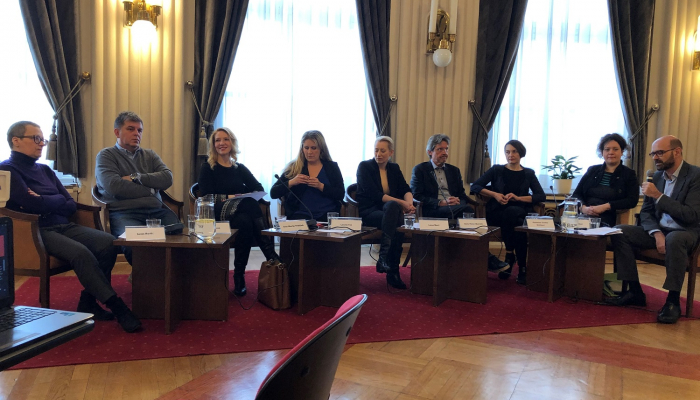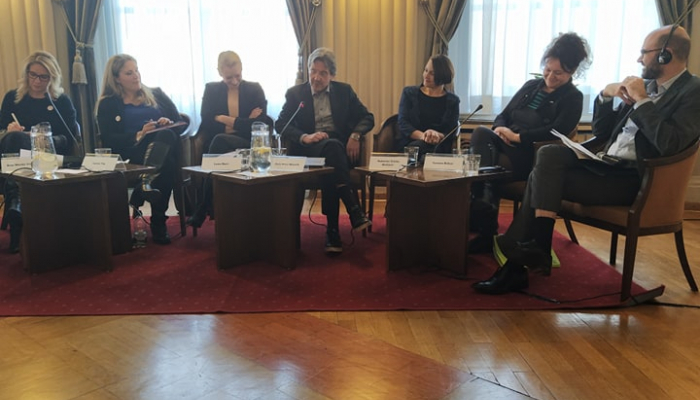European meeting: panel on gender equality in audiovisual industry


There is no equality, the audiovisual sector – especially film, TV and production – is a male-dominated world and there is a need for immediate change. This is the conclusion of two panels held at the Croatian Journalists' Association building on Thursday, 30th Jan, 2020.
The panel discussions held on the occasion of presenting the results of 'Monitoring the implementation of the Framework of Action on gender equality and mapping initiatives to promote diversity in the European audiovisual sector,' a two-year European project whose partners included the International Federation of Film Producers Associations (FIAPF), the European Audiovisual Production Association (CEPI), the European Broadcasting Union (EBU), the Association of Commercial Television in Europe (ACT), the Association of European Radios (AER), the International Federation of Actors (FIA), the European Federation of Journalists (EFJ), the International Federation of Musicians (FIM), the International Arts and Entertainment Alliance (UNI MEI) and the UNI Global Union.
The results reveal that women comprise 39% of the total global workforce, but only hold 27% of managerial positions. The pay gap between women and man in Europe stands at 16% while the discrepancy in pensions is as high as 37% in favour of men. When it comes to female media workers, two thirds have experienced some form of online abuse or harassment at least once. Women on average receive three times more abusive comments on social media than their male colleagues.
The results of the project that was conducted in association with a series of organisations in the European audiovisual sector were presented by Dearbhal Murphy from the International Federation of Actors (FIA) before the first panel discussion entitled 'Gender equality and diversity in TV and film production industry.'
Tamara Babun (Croatian Producers Association), Katarina Zrinka Matijević (Croatian Film Directors' Guild), Dario Vince (Croatian Association of Independent Producers), Ana-Marija Vrdoljak (Croatian Association of Drama Artists), Lana Barić (Croatian Film Workers' Association) Chris Marcich (Croatian Audivisual Centre) and Sanja Ravlić (Croatian expert on the EU Open Method of Coordination working group 'Gender equality in the cultural and creative sectors') participated in the panel.
"In order to achieve equality, it is necessary to adopt positive practices, devise a strategy and raise awareness about the problem. Public funds and public media companies should reinforce change; sexual harassment and violence need to be prevented and we need to make small steps towards changing the way we work,” said Murphy.
When it comes to film and production, the data for Croatia is lamentable, warns Katarina Zrinka Matijević of the Croatian Film Directors' Guild.
“Of the 209 films made in the period between 1990 and 2918, only five had female cinematographers and only 15 were made by female directors. The only field in which women comprise a vast majority, with 189 employed, is costume design, because this is hard and often underpaid work,”, stressed Matijević. A detailed breakdown of women represented in the Croatian audiovisual industry presented by Katarina Zrinka Matijević can be found on the following link.
In the area of film production, in the rest of Europe the situation is not any better if we observe the number of female directors whose films compete at major film festivals. In Cannes there are only 7%, in Berlin 11%, Venice 11% and Pula 5% of female directors in competition.
Dario Vince of the Croatian Association of Independent Producers believes that one of the solutions is to work on increasing the number of female entrepreneurs. He pointed out that in the association that he represents, out of 14 companies, only 3 are headed by women.
“I believe that female participation in this sector is very important because it would give women more influence. An independent producer is a company that initiates projects in the audiovisual industry, chooses the topics and the collaborators, creates the business and production model for the realization of these projects, gathers funds and ensures the promotion of these projects. Their influence on the outline of the project, the participation of the author and all other collaborators is quite considerable. The position of the producer of audiovisual works offers a greater possibility of influencing the culture in which this artistic work is made from within,” said Vince, adding that AV production is still a “man’s world.”
Lana Barić of the Croatian Film Workers' Association believes that the situation needs improve and that this is a fight we must not give up. She believed that the solution is to take 'small steps' every day.
“People believe that the fight for gender equality is a fight for more rights and some people will acuse us of constantly complaining. But, our fight is for equal rights that we do not yet have. It makes me angry that we are all so polite about it, and I do not want to apologize any more for things that are simply not okay. I think these sort of events are important because they raise the visibility of the issue. We have to keep highlighting this problem. At the Croatian Film Workers' Association, I try to raise awareness of our members to keep fighting and to assume responsibility because that is the only way things are going to change. I truly believe that for now we have to tackle the problem by outside means, which is why I will continue stressing the importance of quotas,” said Barić, pointing out that there were very few men from the audiovisual industry present at the European meeting on gender equality, and that it is a worrying indicator that the topic is also of little interest to Academy of Dramatic Art students.
Sanja Ravlić, Croatian expert on the EU Open Method of Coordination working group “Gender equality in the cultural and creative sectors,” states that true equality will occur only when women have the privilege of being “as average as men” and says that one of the steps towards a solution is developing a strategy for the Croatian audiovisual sector. Head of the Croatian Audiovisual Centre Chris Marcich supported this idea.
“Undeniably, the position of women in the Croatian Audiovisual industry is not strong enough. Improving the situation requires great strategic efforts and this is something the Croatian Audiovisual Centre will focus on”, said Marcich who believes that the problem of inequality begins as early as high school, which is another aspect that needs to be addressed. Head of HAVC also said that a number of women have already been included in the decision-making process as artistic advisors and that he plans to hire a third artistic advisor for feature film and hopes that, in addition to Snježana Tribuson, this person will be a woman.
*Author of the cover photo is Sindikat novinara Hrvatske
